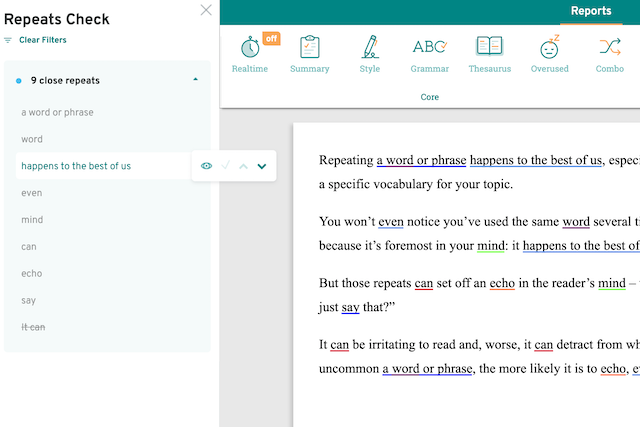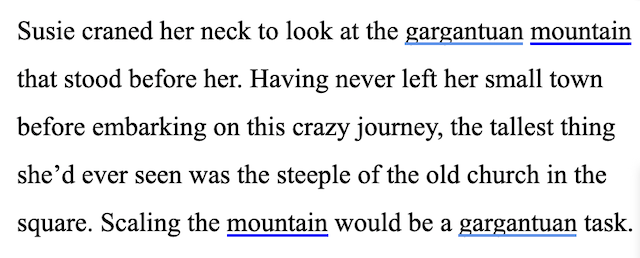Repeating a word or phrase happens to the best of us, especially if you’re writing an article and using a specific vocabulary for your topic. You won’t even notice you’ve used the same word several times in the span of one paragraph because it’s foremost in your mind.
But those repeats can set off an echo in the reader’s mind – that subconscious feeling of “Didn’t he just say that?” It can be irritating to read and, worse, it can detract from what you are trying to say. The more uncommon a word or phrase, the more likely it is to echo, even pages apart.
Consider the following text:
- At your next get-together, cook together as a family and enjoy the benefits of creating a meal together and the bond you’ll create.
It is easy as the reader to point out how many times “together” is used in the above example, but as the writer, you know what you meant to express and so the emphasis sounds natural to you.
Although it happens all the time, it can be difficult for you, as the writer, to spot when you re-read it. When you are editing you usually go over the same piece several times and so you become impervious to that echo feeling. And when you are looking at a sentence on its own and making amendments, you can sometimes input a word that is just right for that sentence, forgetting that you also used it in the one before or after.
ProWritingAid’s Echoes Report highlights words and phrases repeated within a few paragraphs so you can easily track down unintended repetition and replace it with a more diverse vocabulary.
How to Use The Echoes Report
You can find the Echoes Report in the 'Repeats' section of the ProWritingAid toolbar. The report appears in all of ProWritingAid's apps, extensions and integrations, so you can use it wherever you write. Simply open the editor, upload your text and hit 'Echoes'.

The report will highlight all repeats that are within a couple of paragraphs of each other. In the example above, I've used 'It happens to the best of us' twice within a couple of sentences. The report highlights this phrase within my document and lists it in the navigation menu to the left.
If I hover over the phrase in the list, a toolbar appears (as above). If you decide you're happy to repeat the word or phrase, this gives you the option to hide its highlights within your document so that you can focus on other repeats. If you'd like to jump to that phrase within your text, you can use the arrows to the right of the toolbar allow you to move quickly between instances of that phrase.
To navigate all of the highlights in your document, simply hover your mouse over '9 Close Repeats' at the top of the menu. A similar toolbar will appear, however now the arrows to the right will skip through each highlight in the report so you can deal with them methodically.
How is The Echoes Report Useful?
Now you know how to navigate the report, let's look at how you can use it to make your writing stronger.
Let's say you're writing a novel. You want to use strong words that convey an image clearly to your reader, so when you write...
"Susie craned her neck to look at the big mountain that stood before her."
...'big' doesn't really cut it. So then you try:
"Susie craned her neck to look at the gargantuan mountain that stood before her."
Gargantuan isn't a word that's used much day to day. Using it in the first place might be a little risky, so using it twice is a definite no-go. But because it's an unfamiliar word, it sits at the top of your mind. So a few sentences later:
"Susie craned her neck to look at the gargantuan mountain that stood before her. When she left her small town before embarking on this crazy journey, the tallest thing she’d ever seen was the steeple of the old church in the square. Scaling the mountain would be a gargantuan task."
When you're in the flow of writing, words can leap onto the page without you really noticing. Sure, you're likely to pick up an unusual repeats like 'gargantuan' yourself when you proofread, but sometimes when you're paying close attention to grammar errors or typos the more everyday words slip through.
For example, did you notice 'mountain'?

If you didn't, you might be wondering what the problem is. If you, the reader, didn't notice it, then it won't set off that echo. Maybe not, but this does highlight an opportunity to be a little more specific.
We've already established that Susie has to climb a mountain. We also know that its height is a factor in how difficult it will be to climb. So instead of using its size again, let's look at the details:
"Susie craned her neck to look at the gargantuan mountain that stood before her. When she left her small town before embarking on this crazy journey, the tallest thing she’d ever seen was the steeple of the old church in the square. She looked up at the jagged rocks, noticing a few of them were loose and close to slipping. She'd have to tread carefully."
Now we know why the task will be particularly difficult. We have a couple of details to start imagining the scene.
With the Echoes Report, you can see clearly where you've used a word repeatedly, allowing you to recognize the places where you can fill in the gaps and enrich your scenes and descriptions.
Final Thoughts
Noticing every single repeat in your manuscript isn't easy. With the Echoes Report, you can quickly figure out where you need to focus to make the most improvement in the shortest amount of time.
